
Aug 23
1866 The Treaty of Prague is signed—formally ending the Seven Weeks' War between Austria and Prussian-led German states.
The 1866 campaign was a carefully planned stage in the unification of Germany under Prussia's Hohenzollern dynasty, of which Otto von Bismarck was the principal agent. The issue was clear-cut: Prussia deliberately challenged Austria for the leadership of the German Confederation. Prussia had challenged Austria in 1850, but the complete failure of its mobilization in that year compelled the acceptance at Olmutz of the somewhat humiliating terms of Austria. Since then Prussia, with Bismarck as statesman, Count Helmuth von Moltke as strategist, and Count Albrecht von Roon as army organizer, had prepared methodically for a fresh challenge. The actual pretext found by Bismarck in 1866 was a dispute over the administration of Schleswig and Holstein, which Austria and Prussia had seized from Denmark in 1864 and had since held jointly.
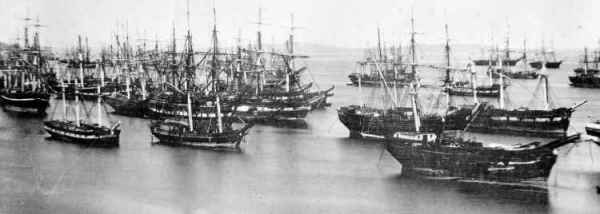
1872 A load of tea arrives in San Francisco aboard the first Japanese commercial ship to visit the US.
[See: Countdown to Infamy: Timeline to Pearl Harbor.]1883 Birth: General Jonathan Wainwright: hero of Bataan in World War II. Will fight against the Japanese on Corregidor in the Philippines, but be forced to surrender and spend many years in captivity. His Medal of Honor citation reads:
Distinguished himself by intrepid and determined leadership against greatly superior enemy forces. At the repeated risk of life above and beyond the call of duty in his position, he frequented the firing line of his troops where his presence provided the example and incentive that helped make the gallant efforts of these men possible. The final stand on beleaguered Corregidor, for which he was in an important measure personally responsible, commanded the admiration of the Nation's allies. It reflected the high morale of American arms in the face of overwhelming odds. His courage and resolution were a vitally needed inspiration to the then sorely pressed freedom-loving peoples of the world.
1914 World War I: Various:
The Belgian defenders of Namur are overwhelmed by Bulow's troops:
As the French armies hurled themselves at the German frontiers in eastern France, the main German advance began through neutral Belgium. Hardly a warlike nation, it was not expected that the Belgian army would put up more than a token resistance to the invading armies. Much to everyone's surprise and to the German's annoyance, the little nation of shopkeepers and farmers proved to be a tougher nut to crack than was expected. There was little doubt as to the ultimate outcome, but even so the forts of Liege held up the German advance for 2 weeks and provided the Allies and the Belgians with great newspaper headlines.
Battle of Mons:
The Battle of Mons was the last of four "Battles of the Frontiers" that took place over as many days on the Western Front between Allied and German forces in the opening month of World War I. The first three—at Lorraine, Ardennes and Charleroi—involved French forces under the central command of General Joseph Joffre . . . .
At nine o'clock on the morning of August 23, German guns opened fire on the British positions at Mons, focusing on the northernmost point of a salient formed by a loop in the canal. Though Von Kluck and the 1st Army enjoyed two-to-one numerical superiority, they did not make effective use of it, and the British regiments at the salient admirably withstood six hours of shelling and infantry assault. Lanrezac's decision, late in the day, to order a general retreat of the French 5th Army at Charleroi left the BEF in danger of envelopment by the Germans, and a decision was made to withdraw the troops as soon as possible. By the time the battle ended after nine hours, some 35,000 British soldiers had been involved, with a total of 1,600 casualties.
Thus the first day of British combat in World War I ended in retreat and bitter disappointment, although the steadfastness of the BEF had delayed Von Cluck's advance by one day. Within weeks of the battle, however, British public imagination elevated Mons to mythic status and those who had died to heroes, until the British defeat came to seem more like a victory in retrospect. The most prevalent legend was that of the "Angel of Mons," who had appeared on the battlefield carrying a flaming sword and faced the advancing Germans, impeding their progress. In reality, victory in the four Battles of the Frontiers imbued the Germans with a tremendous sense of confidence, as they continued their relentless advance through Belgium into northern France— eventually controlling the industrial power of both nations, including coal, iron ore, factories, railroads and rivers— and the Allies scrambled to ready their defenses. [For further details, Click here.]
Galician Battles (Aug 23-Sep 11): Russian forces under General Nikolai Ivanov repel an Austrian offensive, seizing all of Austrian Galicia except the key fortress of Przemysl.
In the late summer of 1914, the ancient monarchies of Austria, Russia, and Germany plunged their countries into a world war which engulfed Europe in one of the bloodiest conflicts in history. The Eastern Front of that great war had a profound impact on the remainder of the 20th century, even though the Western Front with its British, French and American combatants achieved somewhat greater fame. The statistics for the Eastern war are grim. More than three-million men died in the fighting, more than nine-million men were wounded, and every major country which participated lost its form of government. One of them, Russia, collapsed so completely and catastrophically that the ensuing consequences still resonate in today's world. It was into this conflict that the soldiers of 1914 marched, with an eagerness and confidence which has not since been repeated.
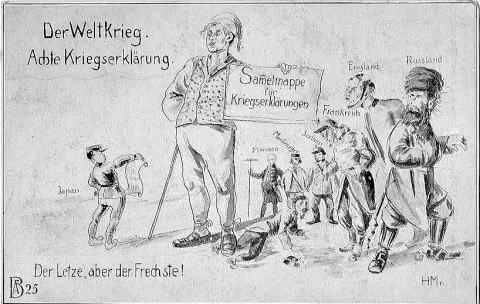
Japan declares war on Germany—and soon besieges Tsingtao, the only German base on the China coast. The protectorate had not yet fulfilled all of Germany's economic expectations when Japanese troops occupied Tsingtao and the Bay of Kiaochow at the beginning of the First World War. German colonial rule in China ended de facto in the transport of German soldiers to Japan as prisoners of war, and de jure in the Treaty of Versailles. Tsingtao lived under Japan's colonial rule until 1922.
Hindenburg and Ludendorff arrive to take command on the Eastern Front:
After a very successful career before the war, Hindenburg retired in 1911, only to be recalled to command the Eighth Army in Prussia, with General Ludendorff as his Chief of Staff, on 22 August 1914. On arrival at Marienburg on 23 August, he approved Ludendorff and Col. Max Hoffmann's plan to counterattack and 'double envelope' Samsonov's Second Russian Army, which resulted in the German victory at Tannenberg.

1915 World War I: List Regiment: Gefreiter Adolf Hitler's 16 Reserve Infantry Regiment continue to occupy a position at Fromelles—pictured above in a drawing by Hitler—on a level field with water channels, willow trees and willow stalks; in the distance towards the enemy lines lies an insignificant wood with barbed wire entanglements. Under the direction of their defense-minded commander, Lieutenant General Gustav Scanzoni von Lichtenfels, the regiment works ceaselessly day and night to further fortify their position at Fromelles while fighting off repeated assaults by the enemy. [For further details, Click here.]
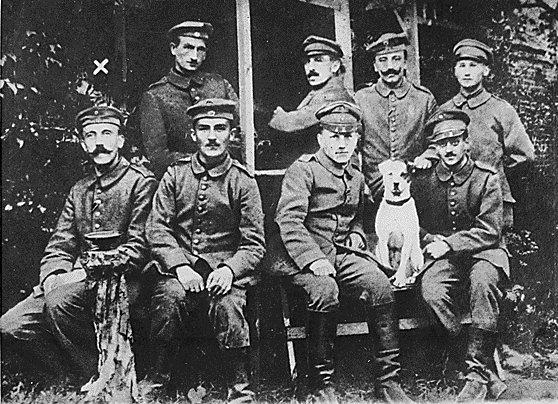
1916 World War I: List Regiment: Gefreiter Adolf Hitler endures trench warfare in Flanders (Artois) with 3 Company, 16 Reserve Infantry Regiment [List Regiment]. [For further details, Click here.]
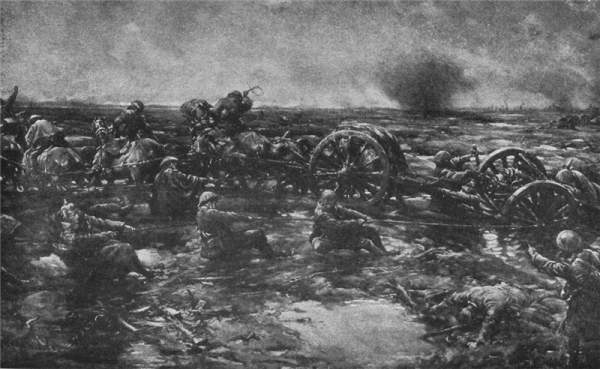
1917 World War I List Regiment (July 22-September 8): Dispatch Runner Gefreiter Adolf Hitler serves at the front with 3 Company, 16 Bavarian Reserve Infantry Regiment during Phase 2 operations in Flanders. Most of their time in the trenches gas masks are worn, while English bombers attack from the air and tanks attempt to advance over a long front through seas of mud. [For further details, Click here.]
1918 World War I List Regiment (August 21-25): Gefreiter Adolf Hitler attends a signals training course in Nuremberg. [For further details, Click here.]
1929 Hebron massacre: An Arab attack of the Jewish community in the British Mandate of Palestine results in 133 Jews killed, 67 in Hebron.
1932 Eugenics: Dr. C. B. Davenport, speaking at the International Congress of Eugenics in New York, suggests Professor Fischer as his successor as president of the International Federation of Eugenic Organizations. Professor Fischer declines, due to other commitments, and Dr Rudin (in Munich) is elected.
The principal manifestations of eugenics are racism and abortion. Eugenics is the driving force behind euthanasia, in vitro fertilization, and embryo and fetal research. It is the driving force in global population policy, and affects American foreign policy. It is the force driving much of the environmentalist movement, welfare policy and welfare reform, and health care. It is found in anthropology, sociology, psychology all the social sciences. Further, it is reflected in much literature, especially science fiction. So it is worth some study.
1936 Church and Reich: The German Evangelical Church publishes its manifesto:
The German Christian movement was born out of the tendency of the Protestant church to incorporate of elements of the Volk traditions as a response to the uncertainty of the Weimar years. It incorporated the renewed emphasis on scripture that began in 1920's, as well as the belief that the German people had a deep spirituality, rooted in the land, that was unlike that any other people. They also sought to de-emphasize the Old Testament, and insert an "Aryan paragraph" that asserted the primacy of the Aryan race. Another influence was the Luther Renaissance Movement, led by Professor Emmanuel Hirsch. The movement did not believe in the static nature of religion, but in its evolution. In Hirsch's view, the Church became more Lutheran by becoming more German.
1937 Various:
Romania: The Radical Peasants Party criticizes the anti-Semitism of the Romanian Orthodox Church. (THP)
From a US State Department Press Release:
Without attempting to pass judgment regarding the merits of the controversy, we appeal to the parties to refrain from resort to war. We urge that they settle their differences in accordance with principles which, in the opinion not alone of our people but of most peoples of the world, should govern in international relationships. We consider applicable throughout the world, in the Pacific area as elsewhere, the principles set forth in the statement of July 16. That statement of principles is comprehensive and basic It embraces the principles embodied in many treaties, including the Washington Conference treaties and the Kellogg-Briand Pact of Paris. From the beginning of the present controversy in the Far East we have been urging upon both the Chinese and the Japanese Govern meets the importance of refraining from hostilities. [For the full text, Click here.]
1939 The Hitler-Stalin (or Molotov-Ribbentrop) Pact:
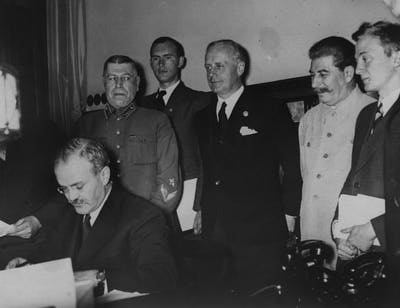
On this day in 1939, Germany and the Soviet Union sign a non-aggression pact, stunning the world, given their diametrically opposed ideologies. But the dictators were, despite appearances, both playing to their own political needs.
After Nazi Germany's invasion of Czechoslovakia, Britain had to decide to what extent it would intervene should Hitler continue German expansion. Prime Minister Neville Chamberlain, at first indifferent to Hitler's capture of the Sudetenland, the German-speaking area of Czechoslovakia, suddenly snapped to life when Poland became threatened. He made it plain that Britain would be obliged to come to the aid of Poland in the event of German invasion. But he wanted, and needed, an ally. The only power large enough to stop Hitler, and with a vested interest in doing so, was the Soviet Union. But Stalin was cool to Britain after its effort to create a political alliance with Britain and France against Germany had been rebuffed a year earlier. Plus, Poland's leaders were less than thrilled with the prospect of Russia becoming its guardian; to them, it was simply occupation by another monstrous regime.
Hitler believed that Britain would never take him on alone, so he decided to swallow his fear and loathing of communism and cozy up to the Soviet dictator, thereby pulling the rug out from the British initiative. Both sides were extremely suspicious of the other, trying to discern ulterior motives. But Hitler was in a hurry; he knew if he was to invade Poland it had to be done quickly, before the West could create a unified front. Agreeing basically to carve up parts of Eastern Europe—and leave each other alone in the process—Hitler's foreign minister, Joachim von Ribbentrop, flew to Moscow and signed the non-aggression pact with his Soviet counterpart, V.M. Molotov (which is why the pact is often referred to as the Ribbentrop-Molotov Pact). Supporters of bolshevism around the world had their heretofore romantic view of "international socialism" ruined; they were outraged that Stalin would enter into any kind of league with the fascist dictator.
But once Poland was German-occupied territory, the alliance would not last for long.
The Government of the German Reich and the Government of the Union of Soviet Socialist Republics desirous of strengthening the cause of peace between Germany and the USSR and proceeding from the fundamental provisions of the Neutrality Agreement concluded in April 1926 between Germany and the USSR, have reached the following agreement: Article I: Both High Contracting Parties obligate, themselves to desist from any act of violence, any aggressive action, and any attack on each other, either individually or jointly with other powers. Article II: Should one of the High Contracting Parties become the object of belligerent action by a third power, the other High Contracting Party shall in no manner lend its support to this third power. Article III: The Governments of the two High Contracting Parties shall in the future maintain continual contact with one another for the purpose of consultation in order to exchange information on problems affecting their common interests. Article IV: Neither of the two High Contracting Parties shall participate in any grouping of powers whatsoever that is directly or indirectly aimed at the other party. Article V: Should disputes or conflicts arise between the High Contracting Parties over problems of one kind or another, both parties shall settle these disputes or conflicts exclusively through friendly exchange of opinion or, if necessary, through the establishment of arbitration commissions. Article VI: The present treaty is concluded for a period of ten years, with the provision that, in so far as one of the High Contracting Parties does not denounce it one year prior to the expiration of this period, the validity of this treaty shall automatically be extended for another five years. Article VII: The present treaty shall be ratified within the shortest possible time. The ratifications shall be exchanged in Berlin. The agreement shall enter into force as soon as it is signed.
Secret Additional Protocol of the Molotov-Ribbentrop Pact:
On the occasion of the signature of the Nonaggression Pact between the German Reich and the Union of Socialist Soviet Republics the undersigned plenipotentiaries of each of the two parties discussed in strictly confidential conversations the question of the boundary of their respective spheres of influence in Eastern Europe. These conversations led to the following conclusions: 1. In the event of a territorial and political rearrangement in the areas belonging to the Baltic States (Finland, Estonia, Latvia, Lithuania), the northern boundary of Lithuania shall represent the boundary of the spheres of influence of Germany and the USSR. In this connection the interest of Lithuania in the Vilna area is recognized by each party. 2. In the event of a territorial and political rearrangement of the areas belonging to the Polish state the spheres of influence of Germany and the U.S.S.R. shall be bounded approximately by the line of the rivers Narew, Vistula, and San. The question of whether the interests of both parties make desirable the maintenance of an independent Polish state and how such a state should be bounded can only be definitely determined in the course of further political developments. In any event both Governments will resolve this question by means of a friendly agreement. 3. With regard to Southeastern Europe attention is called by the Soviet side to its interest in Bessarabia. The German side declares; its complete political disinterestedness in these areas. This protocol shall be treated by both parties as strictly secret.
The British and French Special Military Mission leaves Moscow. From a Conversation between Stalin, Ribbentrop, and Molotov:
Herr Stalin and Molotov commented adversely on the British Military Mission in Moscow, which had never told the Soviet Government what it really wanted. The Reich Foreign Minister stated in this connection that England had always been trying and was still trying to disrupt the development of good relations between Germany and the Soviet Union. England was weak and wanted to let others fight for its presumptuous claim to world domination. Herr Stalin eagerly concurred and observed as follows: the British Army was weak; the British Navy no longer deserved its previous reputation. England's air arm was being increased, to be sure, but there was a lack of pilots. If England dominates the world in spite of this, this was due to the stupidity of the other countries that always let themselves be bluffed. It was ridiculous, for example, that a few hundred British should dominate India. The Reich Foreign Minister concurred and informed Herr Stalin confidentially that England had recently put out a new feeler which was connected with certain allusions to 1914. It was a matter of a typically English, stupid maneuver. The Reich Foreign Minister had proposed to the Fuehrer to inform the British that every hostile British act, in case of a German-Polish conflict, would be answered by a bombing attack on London.
Italy: Sir Percy Lorain, British Ambassador to Rome, informs his government that he is confident the Italians will not fight. Mussolini declares himself ready to mediate. President Roosevelt writes to King Victor Emmanuel of Italy:
It is my belief and that of the American people that Your Majesty and Your Majesty's Government can greatly influence the averting of an outbreak of war. Any general war would cause to suffer all nations whether belligerent or neutral, whether victors or vanquished, and would clearly bring devastation to the peoples and perhaps to the governments of some nations most directly concerned. The friends of the Italian people and among them the American people could only regard with grief the destruction of great achievements which European nations and the Italian nation in particular have attained during the past generation.
We in America having welded a homogeneous nation out of many nationalities, often find it difficult to visualize the animosities which so often have created crises among nations of Europe which are smaller than ours in population and in territory, but we accept the fact that these nations have an absolute right to maintain their national independence if they so desire. If that be sound doctrine then it must apply to the weaker nations as well as to the stronger.
Hitler writes back to Neville Chamberlain:
Germany was prepared to settle the questions of Danzig and of the Corridor by the method of negotiations on the basis of a truly unparalleled magnanimity, but the allegations put forth by England regarding a German mobilization against Poland, the assertion of aggressive designs toward Romania, Hungary, etc. as well as the so-called Guarantee Declarations which were subsequently given had dispelled any Polish inclination to negotiate on a basis which would have also been tolerable for Germany... The German Reich government has received information to the effect that the British government has the intention to carry out measures of mobilization which, according to the statements contained in your own letter, are clearly directed against Germany alone . . . . I therefore inform your Excellency that in the event of these military announcements being carried into effect, I shall order the immediate mobilization of the German armed forces.
Belgium proclaims its neutrality and mobilizes its army for defense: From the Broadcast Appeal by His Majesty the king of the Belgians in the name of the Heads of States of the Oslo Group of Powers:
War psychosis is invading every home, and although conscious of the unimaginable catastrophe which a conflagration would mean for all mankind, public opinion abandons itself more and more to the idea that we are inevitably to be dragged into it. It is important to react against so fatal a spirit of resignation. There is no people-we assert it with confidence-which would wish to send its children to death in order to take away from other nations that right to existence which it claims for itself. It is true that all States do not have the same interests, but are there any interests which cannot be infinitely better reconciled before than after a war.
Hitler sets the date for the invasion of Poland: Saturday, August 26, at 4:30am.
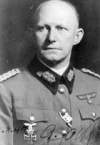
Colonel-General Alfred Jodl: is appointed Chief of staff of the armed forces supreme command (OKW).
Poland: Foreign Minister Beck agrees, rather late in the game, to allow passage of Soviet troops through Poland to help defend against a supposed attack by Germany.
France: French citizens are advised to leave Paris. Daladier asks the Permanent Committee for National Defense whether they can stand by and watch the disappearance of Poland and Rumania; they agree that they cannot.
Churchill leaves France and returns to London.
Germany: Orders are issued to confiscate all radios belonging to German Jews. (THP)
1940 World War II: Blitz (Aug 23-24): 12 German bombers, unable to locate their targets during an unusual night attack, scatter their bombs aimlessly on South London despite strict orders from Hitler forbidding attacks on civilian targets, especially the city of London. Nine civilians are killed. In retaliation British bombers will attack Berlin several times during the following weeks. (THP)
1941 Church and Reich: Various: Euthanasia: Hitler orders a halt to Aktion T4, the euthanasia program, in Germany. More than 70,000 Germans have been gassed since the passage of the Euthanasia Decree of September 1, 1939. Bishop Galen's sermon (See Aug 3) is probably the single most important reason Hitler is forced to abandon the euthanasia program, although it will quietly continue to operate under the code-name: 14f13. Thousands of political prisoners, habitual criminals, Jews and others too sick to work are certified insane and put to death in concentration camps gas chambers. (THP)
Church property: Hanns Kerrl complains to the head of the Reich Chancellery that because of the continuing confiscations of Church property, which are taking place without his being consulted or even informed beforehand, his continuation as Minister of Ecclesiastical Affairs is becoming "increasingly unbearable." Note: Bormann, when questioned about the continuing seizures, excuses them by saying they had been decided before Hitler's order of July 30. (THP)
1942 World War II: Battle of Stalingrad begins: German troops reach the Volga above Stalingrad. The Luftwaffe begins heavy bombing of the city with high explosives and incendiaries, causing 40,000 casualties within a few hours.
1943 World War II: Various: The Third Battle of Kharkov—often regarded as the last successful German offensive in the USSR—and is still studied in military academies as a textbook example of mobile defence. The city remained only temporarily in Axis hands. On August 22, 1943, in the aftermath of the Battle of Kursk, the Germans were driven out once again. Despite its significance, the battle has been the subject of minimal post-war academic study.
War in the Air: The Allies launch the heaviest Allied air raid to date against Berlin. Large parts of the Friedrichstrasse and Wilhelmstrasse are destroyed, including several ministries, hotels, department stores and other landmarks. (THP)
Slave labor: The first 107 inmates arrive at Nordhausen from Buchenwald to begin work on the underground rocket facility soon to be known as Camp Dora. (Sereney) Constructed as a sub-camp of the Buchenwald concentration camp, Dora-Mittelbau, located near the town of Nordhausen in Eastern Germany, became an independent camp in the fall of 1944. Beginning in 1943, thousands of prisoners were assigned to Dora to expand the tunnels of an old salt mine buried deep in the Hartz Mountains. They built an underground factory that produced the secret V-1 and V-2 rockets. Human life meant nothing in the Nazis' quest to turn the tide of war and avoid defeat. 1944 World War II: Various: A US Army Air Force B-24 Liberator bomber crashes into a school in Freckleton, England killing 61 people:
I saw the tail of the plane in the centre of the road in front of the School — it looked like a lorry. As I was looking, almost instantaneously the School, highway and plane burst into flames. This was preceded by a vivid flash of lightning. This happened at the most severest part of the thunderstorm. I went to the fire, but the heat was too intense to get close.
Churchill to British Minister of Information:
Is there any stop to the publicity for the facts about the agony of Warsaw, which seems, from the papers, to have been practically suppressed? It is not for us to cast reproaches on the Soviet Government, but surely the facts should be allowed to speak for themselves? There is no need to mention the strange and sinister behavior of the Russians, but is there any reason why the consequences of such behavior should be made public?
From a message by Warlimont:
Supreme Command West; teletype message Number 1750/44; top secret; 23 June 1944. The treatment of enemy commando groups has so far been carried out according to the order referred to. With the large-scale landing achieved, a new situation has arisen. The order referred to directs, in Paragraph 5, that enemy soldiers who are taken prisoner in open combat or surrender within the limits of normal combat operations (such as large-scale landing operations and undertakings) are not to be treated according to Paragraphs 3 and 4. It must be established in a form easily understood by the troops how far the concept 'within the limits of normal combat operations, etc., is to be extended. Considerable reprisals against our own prisoners must be expected if its contents become known. The application of Number 5 for all enemy soldiers in uniform penetrating from the outside into the occupied western territories is held by the Supreme Command West to be the most correct and clearest solution . . . . 1. The Commando Order remains basically in effect, even after the enemy landing in the West. 2. Number 5 of the order is to be clarified to the effect that the order is not valid for those enemy soldiers in uniform who are captured in open combat in the immediate combat area of the beachhead by our troops committed there, or who surrender. Our troops committed in the immediate combat area means the divisions fighting on the front line as well as reserves up to and including corps headquarters. 3. Furthermore, in doubtful cases, enemy personnel who have fallen into our hands alive are to be turned over to the SD, upon whom it is incumbent to determine whether the Commando Order is to be applied or not. 4. Supreme Command West is to see to it that all units committed in its zone are orally acquainted in a suitable manner with the order concerning the treatment of members of commando undertakings of 18 October 1942, along with the above explanation.
Romania: Ion Antonescu and his foreign ministers are summoned by King Michael. They are kidnapped in the palace and delivered to a Communist agent named Bodnaras. King Michael makes a radio broadcast announcing that an armistice has been signed with the Russian command and orders the Romanian Army to cease all resistance. No armistice has been signed, and sixteen Romanian divisions are deceived into surrendering. They are quickly transported to prison camps in Russia and Siberia. (THP)
1946 Nuremberg Tribunal: Two Hundred and Tenth Day. The Prosecution has pointed out that it has presented particularly extensive evidence. It must be conceded that on the basis of the occupation of all of Germany and by the activity of the authorities the last nook and cranny has been searched and the evidence brought here, but for that very reason the material surprises one, on closer examination, because of its scantiness; it is shown that the scope of the Prosecution's charge is not substantiated. Not fragmentary evidence, only systematic evidence can bring conviction that occurrences which happened once at one place necessarily happened constantly everywhere else. The individual occurrences might be summarized into a system only by the "conspiracy" which would demonstrate their criminal character, but it is exactly that conspiracy which ought first to be proved by the disassociated facts. May it please the Tribunal, in the proceedings against the individual defendants, the deeds of individuals were examined. During the proceedings against the organizations, the question we are concerned with is whether a new basic principle is to be introduced into the legal structure of this world. The trial of the Gestapo is given its significance by the conception the Prosecution that the Gestapo had been the most important instrument of power of the Hitler regime. 1946 Ordinance No. 46 of the British Military Government establishes the German Land (state) of Schleswig-Holstein.
Edited by Levi Bookin (Copy editor) Click to join 3rdReichStudies Disclaimer: This site includes diverse and controversial materials—such as excerpts from the writings of racists and anti-Semites—so that its readers can learn the nature and extent of hate and anti-Semitic discourse. It is our sincere belief that only the informed citizen can prevail over the ignorance of Racialist "thought." Far from approving these writings, this site condemns racism in all of its forms and manifestations. 
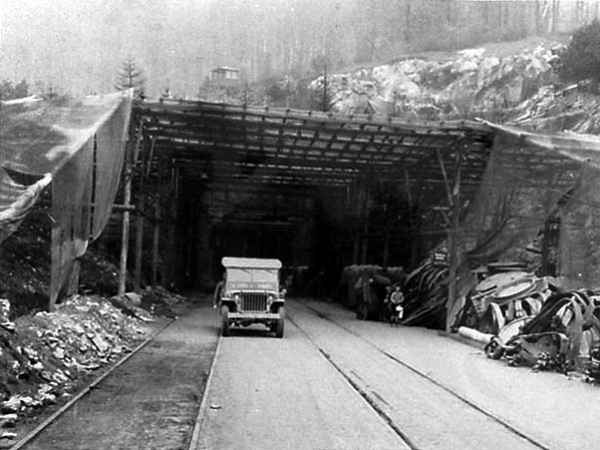
Even by concentration camp standards, prisoners in Dora were treated brutally by their captors. They spent their lives with no glimpse of the sun and with no sanitary facilities, laboring until they dropped. Bodies, covered with lice and often weighing only eighty pounds, were returned to Buchenwald for burning at the rate of 1,000 a month. Once completed, the factory that manufactured the rockets—the state-owned Mittelwerk GmbH—used thousands of prisoners as laborers, including many Jews. They too labored under dismal conditions, drinking their water from leaks in the pipes. Fear of sabotage provided the pretext for guards to employ extraordinary sadism, hanging prisoners or torturing them on a whim. Untold thousands died at Dora and on death marches from the camp in the closing days of the war.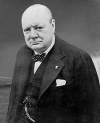
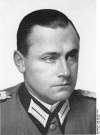
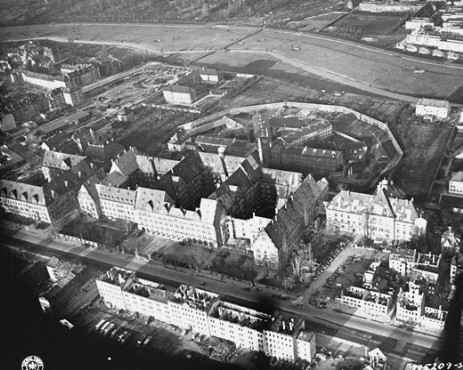
The documents of the Prosecution are contradicted by the testimony of the Defense witnesses. The Prosecution has questioned the credibility of the witnesses on the grounds that they are all witnessed on their own behalf. They were reproached for having remained in office until the end.
If one were to follow this line of thought, the possibility of legal hearing of the members as guaranteed by the Charter would be void of meaning. The witnesses are not appearing on their own behalf, but as witnesses with a general knowledge of occurrences and conditions which can only be cleared up through the members of the organization themselves. Their credibility must be shown by the uniformity of many testimonies.
One cannot in general reject testimony when the express purpose of the proceedings is to eliminate~ evidence on these points in subsequent proceedings. There every individual would be able to bring witnesses for the correctness of his testimony, but too late. If specific testimony is said to be untrustworthy, this must be proved in each case; such evidence cannot, however, be produced by making a witness draw conclusions which he is unable to draw correctly due to lack of insight and knowledge. Only a few witnesses were heard before the Commission and the Tribunal.
The testimony of individual witnesses is no criterion to establish the criminal character of an organization. The witness can generally give little testimony about conditions as a whole which are under examination. Even if he has an -extensive knowledge of things his testimony remains only fragmentary. 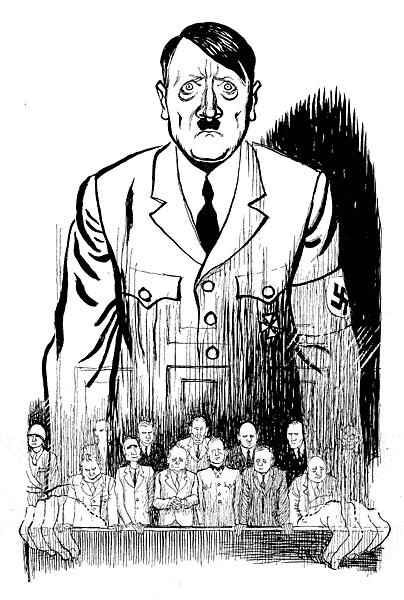
As I defend the Gestapo, it is with the knowledge that a terrible reputation is associated with that name, that it conjures up horror and fear, and that waves of hatred radiate from the very name. The words I am about to speak will be spoken without regard for the opinions of the day, because I hope to be able to present factual and legal evidence which will place this High Tribunal in a position:
(1) To examine whether, by sentencing the organizations, a legal development will be introduced which will serve humanity;
(2) To establish the truth, regarding the Gestapo; and by this
(3) To save the innocent amongst the former members of the Gestapo from a tragic fate.
The first two tasks necessitate the answering of a question which represents a preliminary problem connected with the problem of the Gestapo as a whole.
No allegation made by the Prosecution has shaken me more than the assertion of the British Chief Prosecutor that the Germans, after 6 years of Nazi domination, by replacing the Christian ethical teachings by idolatry of the Fuehrer and the cult of blood, had become a depraved nation. If this judgment is true, then the fact of its existence, apart from the circumstances just mentioned, is due to yet another extraordinary factor-a factor of a character so unusual that history hardly knows it: The symptoms of the demon, the demon in Hitler, and the infiltration of the demon's spirit into his regime and into the institutions which he created and employed.
levi.bookin@gmail.com










Fair Use Notice: This site may contain copyrighted material the use of which has not always been specifically authorized by the copyright owner. We are making such material available in our efforts to advance understanding of historical, political, human rights, economic, democracy, scientific, environmental, and social justice issues, etc. We believe this constitutes a "fair use" of any such copyrighted material as provided for in section 107 of the US Copyright Law. In accordance with Title 17 U.S.C. Section 107, the material on this site is distributed without profit to those who have expressed a prior interest in receiving the included information for research and educational purposes. If you wish to use copyrighted material from this site for purposes of your own that go beyond 'fair use', you must obtain permission from the copyright owner.
Please Note: The list-owner and moderators of 3rdReichStudies are not responsible for, and do not necessarily approve of, the random ads placed on our pages by our web server. They are, unfortunately, the price one pays for a 'free' website.



